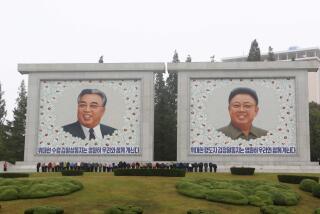U.S. Moves to Quickly Secure Russia’s Vast Nuclear Stockpile
The Bush administration is speeding efforts to safeguard Cold War-era nuclear stockpiles before terrorists can get hold of them, Energy Secretary Spencer Abraham said Friday.
Addressing the Los Angeles World Affairs Council in Beverly Hills, Abraham outlined a series of measures aimed primarily at securing the former Soviet Union’s vast stockpiles of weapon-grade radioactive materials.
“We are facing a situation we think is, frankly, more harrowing than it was a decade ago. . . . I don’t believe I have any higher priority,” Abraham said.
He acknowledged that some efforts to contain the proliferation of nuclear weapons were undertaken during the Clinton administration but said that the attacks on the World Trade Center and the Pentagon on Sept. 11 demonstrated the need to expand and accelerate those efforts, especially in Russia.
The collapse of the Soviet Union led to breakdowns in the protections of 40,000 nuclear weapons, plus assorted nuclear materials, some of which are coveted by terrorist groups and other countries.
Abraham said many of the scientists and technicians who oversee those materials have gone with little or no pay for months at a time, raising concerns they might exchange nuclear products for bribes. Authorities have documented about 200 illicit attempts to acquire nuclear materials in recent years, he said.
Abraham said heightened security measures will include better housekeeping and accounting practices, new technologies and incentives. While they are focused on Russia, they also deal with nuclear materials in Uzbekistan, Kazakhstan and Ukraine, as well as in the United States.
Under an agreement worked out with counterparts in Russia, U.S. officials will help accelerate a program to enhance security for trucks and trains hauling weapon-grade material and to store it in fewer locations to make it less vulnerable to sabotage or terrorist attack. The program will be completed by 2008, two years ahead of schedule, Abraham said.
Other measures he cited include installation of radiation detectors at transit and border crossings to prevent smuggling. President Bush’s budget proposal seeks $1.2 billion for nonproliferation programs, two-thirds of which is earmarked for programs in Russia. A quarter of a billion dollars more is earmarked for research and development of new technologies to help counter nuclear proliferation and terrorism, Abraham said. Russia and the United States have reached agreement on a controversial plan to convert 68 tons of plutonium in both countries into fuel for atomic reactors. Critics challenged the costs to the United States, but Abraham said the administration lopped $2 billion off the program and can complete it within three years.
“If one good thing can come out of the tragedy of Sept. 11, it’s that our nation is now working more closely with Moscow on issues of national security--ours as well as theirs--than we have done at any time in the post-Soviet era,” Abraham said.
A yearlong review of controls led administration officials to conclude that the threat of nuclear materials getting into the wrong hands is greater today than ever, Abraham said.
In the war in Afghanistan, documents left by Al Qaeda and Taliban forces reveal diagrams and information for the construction of crude nuclear devices. Authorities believe terrorists are capable of assembling a “dirty bomb” by using conventional explosives to disperse plutonium or other radioactive materials in an urban area.
In an address before Congress last week, Bush blasted an “axis of evil” consisting of North Korea, Iraq and Iran for promoting terrorism and pursuing weapons of mass destruction.
More to Read
Get the L.A. Times Politics newsletter
Deeply reported insights into legislation, politics and policy from Sacramento, Washington and beyond. In your inbox three times per week.
You may occasionally receive promotional content from the Los Angeles Times.










